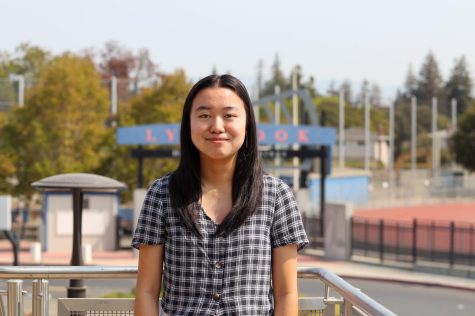Lynbrook’s ELD program adapts to distance learning
Graphic illustration by Elena Williams
While in a normal year ELD students would constantly interact with English speakers at school, in remote learning they are surrounded by their native language. This shift has made the year a uniquely challenging one for Lynbrook’s English learners.
March 17, 2021
Like many other programs, Lynbrook’s English Language Development (ELD) classes faced challenges in adapting to distance learning this year. Still, teachers, equipped with new digital learning platforms and exclusive resources designated to aid ELD students, have continued to foster the language development skills necessary for ELD students.
Based on their English mastery, ELD students take either ELD 2 or ELD 3 to develop their English skills in addition to an integrated ELD version of each year’s grade-appropriate English class. Students test into ELD 2 or ELD 3 upon enrolling at Lynbrook and progress through the year-long courses in order.
Integrated ELD courses, also referred to as sheltered courses, have fewer students per class and are composed entirely of ELD students; however, they generally still cover the same core content as their mainstream counterparts. Lynbrook currently offers integrated versions of most history, science and English classes, in which students balance two objectives: mastering course content and gaining language specific to each subject.
“Students receive a lot of language support in sheltered classes,” ELD Department Lead Maggie Welsh said. “Part of that is allowing them to use glossaries and ask questions about the definitions of words even during tests and quizzes, whereas students fluent in English are expected to remember course-specific vocabulary.”
For classes like Economics and U.S. Government, which have no integrated equivalents at Lynbrook, the ELD department works closely with the course teachers to identify and support students who need additional language support, which include both current and past ELD students who may have a challenge understanding course-specific vocabulary.
After students demonstrate English fluency through the annual, state-administered English Language Proficiency Assessments for California (ELPAC), designed to gauge fluency of ELD students already enrolled in the program, FUHSD requires them to take an additional multiple-choice and written test to confirm their skills and placement. If they pass the district’s assessments, students graduate from the ELD program and are officially reclassified in the district’s records as English-proficient.
One of the largest challenges Lynbrook’s ELD program has faced this year was administering the ELPAC. The ELPAC was to be administered remotely this year, but ELD programs across the district were having difficulty monitoring the video feed and accessing the secure testing browsers — the same one that will be used to administer the CAASPP later this year.
“We got the tech team from the district to help us troubleshoot, but finally we had to call the state and tell them what we were experiencing,” FUHSD’s Coordinator of Curriculum and Teacher Leadership Welton Kwong said. “They made an announcement a day or two after we had called saying they fixed the issue and things are more or less working fine.”
Kwong and his team discovered that the browsers worked best on school-issued Chromebooks, in which the secure browsers were already downloaded, and speculated that existing operating systems on student-owned computers might not have been compatible with the browser. To address the issue, schools are working hard to issue Chromebooks to students, but in case students are unable to come pick up a Chromebook, they can still download the secure browser onto their own device and troubleshoot if needed.
“We can also consider other options,” Kwong said. “We might try to find a different way for students to take the test at a later date. We have toward the end of the semester to complete this, so we have a little bit of cushion to find different solutions to help students access the test.”
At the start of 2020-21’s first semester, Lynbrook purchased site licenses for two digital learning platforms exclusively for the ELD department: ListenWise and NoRedInk. In the past, the ELD program had used the free version of both platforms, but the transition to distance learning changed their needs.
“We were scrambling to pilot online resources in the spring semester last year, and what we were trying to achieve was perhaps overly complex,” Welsh said. “The challenge was to find a stable routine that students could expect, in addition to diversifying how we disseminate our curriculum without offering too many platforms.”
ListenWise is a platform created by National Public Radio, which allows students to listen to interviews and answer questions testing their listening, grammar and understanding of the content. NoRedInk is a tool for writing and grammar practice. ELD classes also make use of Flipgrid, a platform used by Lynbrook’s foreign language department as well, to have students practice their pronunciation.
“Mrs. Welsh, my ELD teacher, will assign us work in NoRedInk and ListenWise,” ELD 2 student Kaiwen Du said. “My English teacher Ms. Ene also uses ListenWise.”
The school has offered specialized support in the form of exclusive office hours only for ELD students, such as those held by history teacher Nate Martell, and the opportunity to return to campus and work in pods. Before the expected partial-reopening of schools on April 19, ELD students can receive a quiet space to complete their schoolwork under teacher supervision. However, no students from the ELD program have yet returned as of March 4 because many parents would prefer that teachers are vaccinated before sending their students to school.
Although ELD students do not have a modified homeroom, the district has made special efforts to help ELD students engage in school-wide experiences, such as the modules on the Pyramid of Hate, race and consent. Kwong created scaffolds to help with the delivery of these modules, because they may be challenging for non-native English speakers, who lack context compared to their peers, to understand. The scaffolds have been helpful for students in other programs as well, such as Lynbrook’s Academic Community Transition program.
“If we build a building, we need scaffolds to do it, but after the building is finished we take down the scaffold,” Kwong said. “It’s the same idea here: We provide discussion questions after homerooms, and we also provide vocabulary banks, sentence frames or sentence starters, so English Learner students can contribute their original thoughts. We want to help students engage in the process, but not hand over the answers to them.”
Certain activities that would otherwise be a key feature of the ELD experience, such as the interdistrict ELD speech competition held each year in May, have been cancelled. ELD students typically spend much of the second semester preparing their speeches, and the competition is well attended, with approximately five hundred ELD students across the district in attendance each year. International Club — which previously provided ELD students with a place to practice language skills and a community to engage in on-campus events, like dances or rallies— disbanded due to declining membership and the challenges of distance learning.
Even freshmen, who haven’t experienced what would constitute the hallmarks of a standard ELD experience, have creative activities they would like to see implemented upon a return to school.
“One activity I’d like to experience if we were able to return to school would be a spelling bee,” Du said. “It would be great if there was a prize for the winner.”
Other activities, like the school-site-based English Learner Advisory Committee (ELAC) and the district-wide District English Learner Advisory Committee (DELAC) meetings have continued virtually. Students enrolled in ELD programs and their parents are invited to attend these meetings through Zoom, where information such as the tests ELD students must take, differences in the college admissions process and sheltered classes are presented.
“In December of 2020, I facilitated our DELAC meeting, which included parents, students and staff members,” Kwong said. “I really wanted to provide a sense of what the ELD and sheltered classes are like, so I did a demonstration lesson over Zoom. I also invited a teacher from Cupertino High School to give a demonstration of a sheltered government class.”
At Lynbrook, ELAC meetings take place every two months, with as many as 70 to 80 parents in attendance. In addition to those with students in Lynbrook’s ELD program, some bilingual parents also join ELAC meetings to clarify points they do not understand from English-only presentations. Parents are separated into language groups — which include but are not limited to Japanese, Mandarin, Cantonese and Hindi — where a translator fluent in English and the group’s native language goes over translated versions of the slides to be presented.
“We’ve had a very successful turnout at our ELAC meetings, in part because our parent co-presidents are very active in getting parents to volunteer as translators,” Welsh said. “These meetings give parents who have children in the ELD program the chance to be active participants in their student’s education, and receive information that otherwise might be unclear about the American education system.”





























































